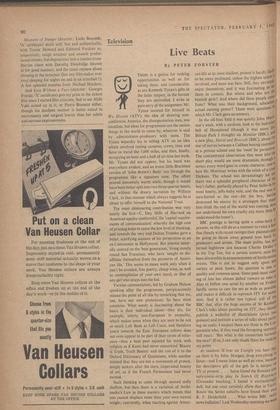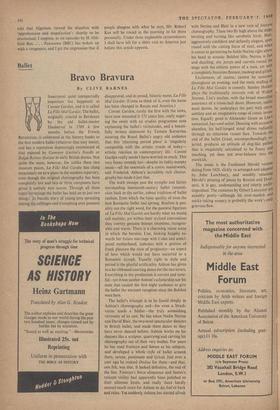Television
Live Beats
By PETER FORSTER THERE is a genius for making opportunities as well as for taking them, and considerable as are Kenneth Tynan's gifts in the latter respect, in the former they are unrivalled. 1 write in pure envy of the assignment Mr. Tynan secured for himself in We Dissent (ATV); the idea of showing non- conformist America, the disorganisation men, was excellent, but ideas for programmes are the easiest things in the world to come by, whatever is said by administrator-producers with none. The Tynan wizardry lay in selling ATV on an idea which involved raising cameras, crews, time and fares to travel the 5,000 miles, and then, finally, occupying an hour and a half of air time last week. Mr. Tynan did not appear, but his hand was everywhere evident, and an ironic little Brechtian version of 'John Brown's Body' ran through the programme like a signature tune. The effort proved immensely worth while, though it would have been better split into two three-quarter hours, and without the dreary narration by William Clark, in that manner which always suggests he is about to offer himself to the National Trust.
The most shimmering contribution was very nearly the first—C. Day Mills of Harvard on American apathy-conformity, the 'capital require- ments of communication' whereby the high cost of printing helps to cause the low level of thinking; and towards the very end Dalton Trumbo gave a bitter, scarifying account of his persecution as an ex-Communist in Hollywood. But interest natur- ally centred on the 'beat generation,' living mostly round San Fransisco, who have 'sought to dis- affiliate themselves from the pressures of Ameri- can life.' This seems to mean work only when it can't be avoided, free poetry, cheap wine, as well as contemplation of your own navel, or that of any girl who strays into the hut.
Various commentators, led by Graham Hutton speaking after the programme, perspicaciously missed the point of all this by remarking that we, too, have our new protestants. So have most countries. What surely is fascinating about the beats is their individual idiom—they arc, for example, utterly non-European in mentality, which makes sense when they are seen to be not so much Left Bank as Left Coast, and therefore yearn towards the East. European culture does not even appear to be part of their terms of refer- ence—thus a beat poet equated his work with religion as if Keats had never committed 'Beauty is Truth, Truth Beauty' and the rest of it to the Oxford Dictionary of Quotations, while another insisted that they are not a movement of protest, simply seekers after the stern, impersonal beauty of art, as if the French Parnassians had never existed.
Such thinking as came through seemed sadly shallow, but then there is a variation of Archi- medes's Law in these matters which means that you cannot displace more than your own mental weight; conversely, when reacting against Ameri- can life at its most shallow, protest is hardly likelY to be more profound, unless the highest talent is involved, and none was here. Still, they obviouslY enjoy themselves, and it was fascinating to see them in context. But where and who are the beatnik girls? And where did these people Co'te from? What was their background, education,' actual earning power? These were questions 10 which Mr. Clark gave no answers. In the off-beat field it was quietly John Mortt' mer's week, with a sardonic look at the bed-sitter belt of Hampstead (though it was more like Belsize Park I thought) on Monitor (BBC), and a new play, David and Broccoli (BBC), about the war of nerves between a Caliban boxing instructor at a private school and the 'swot' he persecutes. The concentrated observation that went into the short play would see most dramatists through 3 series; every word goes to create character, and at ' best Mr. Mortimer writes with the relish of a cruel Dickens. The school was devastatingly hit there was a splendid peripheral character of the boy's father, perfectly played by Peter Sallis in his most hearty, jelly-baby vein, and the end was as sure-footed as the rest—for the boy, having destroyed his enemy by a stratagem that made( him think the end of the world was coming, does I not understand his own cruelty any more than he" understood the boxer's. BBC prestige is having quite a come-back at present, so this will do as a moment to voice a fear that (heady with recent ratings) their planners may be going to throw away ground won back hY producers and artists, The mass public has not turned highbrow just because Charlie Drake i5 in the Top Ten, but a certain esoteric note has been discernible in announcements of forthcoming events. This is not to suggest only sport any variety at peak hours; the question is one of quality and common sense. Some peak-hour view' ing of late has almost defied viewers to take it. Also to follow one serial by another on Fridays hardly seems to cast the net as wide as possible, and makes it difficult to reproach ITV for sane' ness. And it is rather too typical still of the BBC that, after the huge success of Sir Kenneth, Clark's talks about painting on ITV, they should publish a walletful of illustrations (price two guineas) and institute a series of talks about Paint° ing on radio. I suspect there are those in the Car' poration who, if they read the foregoing sentence' will react : 'But what is the connection between the two?' If so, I can only thank them for making my point. At random: If ever on Tonight you hear that an item is by John Morgan, drop everything to listen—and I mean listen as well as view, because for descriptive gift of the gab he is unique Oti TV at present. . . . Some found the Russian n°t' very-comic-strip play In Search Of Happiness (Granada) touching; I found it excruciatingly dull, but one must certainly allow that in Victor Rosav the Soviet suburbs have found their ovol R. F. Delderfield. . . . Who writes BBC radi° news bulletins? Last Wednesday morning we Were told that Algerians viewed the situation with `apprehension and stupefaction': shortly to be dramatised, I suppose, in six episodes by H. Old- field Box. . . . Panorama (BBC) has woken up with a vengeance, and I get the impression that if people disagree with what he says, Mr. Robert Kee will be round in the morning to hit them personally. Under these impossible circumstances I shall have left for a short visit to America just before this article appears.











































 Previous page
Previous page